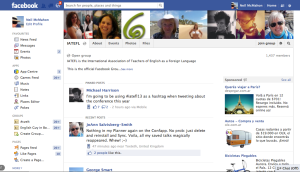
So as promised, here’s what I got out of Day One at IATEFL. To be honest it feels like not very much, since I haven’t had much time to dedicate to it at all – just a few visits to twitter and a quick read through a few emails. I was hoping to watch the plenary session by David Crystal when I got home but then I got distracted by an irrational urge to make Delia’s braised red cabbage to go with the left overs from last night’s beef. Sorry, David, I promise I’ll watch it very soon (I have it on in the background as I write this). Here it is if you’d like to join me…
Congratulations too, David, on your new website launched today as well: http://www.davidcrystal.com something else to bookmark and come back to. Although I was all ready to explore The Memors until I read the description and came across the combination techno-fantasy and tweenagers – not for me then.
Anyway, back to IATEFL and the things that made my day…

The biggest hit of the day for me, popping in and out of the conference asynchronously from the other side of the world, was easily Sandy Millin and her various blog posts on the talks she attended. No idea how she managed to collect so much info about so many things into such short concise blog posts, although I imagine it had a lot to do with blending her tweets together skilfully. Wonderful stuff, Sandy, and most of my impression of day one comes from your posts, so looking forward to more over the next few days.
Unfortunately, one of the drawbacks of Sandy today was that she went to a few talks that I wouldn’t have wanted to go to, mainly because they seem more targeted towards ESL rather than EFL, which is my context. However, I was really interested in reading what she had to say about the following talks:
Penny Ur – Technology in ELT

Penny’s conclusions – a means, not an end
Seems from her conclusions Penny was talking a lot of sense and resonating with my own soundbite when it comes to technology – it’s not what you use or even how you use it but why you use it that counts. Penny’s ‘cautiously, critically, selectively’ mantra seems to reflect that. Though of course it’s also true of every activity we do in the classroom, not just ones using hi-tec specs.
I like this list that Penny shares of the things that technology offers us – word processing, editing tools, the internet, digital dictionaries, improved self-access, more and more engaging written interaction, more easily accessible audiovisual material, distance learning possibilities, and even interactive whiteboards (I’m still sceptical, but then I’ve never actually used one). All these things can help students learn – if we use them purposefully and they therefore give us something that other means don’t. So good common sense there then, but nothing new.
The downside and dangers she discussed aren’t new either, so let’s move on to the activities she offers. Nope, nothing new there either. Although I did come up with a new idea for a mobile lesson myself today, that may well have been discussed in Penny’s talk. I’ve just realised the power of having students with smartphones and the ease with which they can do quiet reading and research in the classroom.
This idea came out of a tweet I saw that wasn’t actually IATEFL linked, but very much linked to why I didn’t post yesterday:

Yes, Thatcher died, and Sean has made a thirty activity lesson out of the news – incredibly impressive (not that I’ve had time to get beyond the quantity yet, but, yet again, I hope to have a look at some point), although it did make me think of a lesson about Thatcher I would do if I had a class at the moment (I’m CELTA training, though subbing Thursday night so I might try this out then), which wouldn’t involve any materials:
Lead-in – get the students to discuss the current news stories and see what they come up with (floods here in Argentina are much bigger news than the Iron Lady’s demise).
Steer conversation around to Thatcher and get the learners to discuss what they know about her and feel about the news of her death.
Lead the conversation towards the whole ‘she’s a saint’ / ‘dance on her grave’ debate and ask them for initial impressions.

Speaks for itself
Get the learners to research the topic. Tell them they have ten minutes to read up on the topic (this is where you need wifi and enough smartphones to at least be able to share in pairs / a computer room) and make notes in preparation for a debate.
Divide the class into two groups, one researches the positive side of Maggie, the other the negative side. It’s a good idea to elicit where they will go to get their stories (Facebook and TWitter are the obvious answers, along with the BBC and British newspapers).
After ten minutes research put each group together (or sub groups in a big class) and get them to share their research with each other.
After an initial comparison and exchange of info, introduce them to the idea of the debate, in which they’ll argue about the merits of Margaret. Quickly outline the debate schedule (I don’t have time to outline this here I’m afraid, wife will be home soon). And then off they go, debating Maggie (my debate format takes at least 45 minutes) to their hearts’ content – As v Bs.
It’s such a simple lesson (if you have the tech) and involves a range of skills – speaking, reading, negotiating, debating, note-taking, listening etc. And minimal preparation time. And of course you can use it again and again whenever you have a controversial news story. I hope Penny would approve of this lesson, since it’s a very simple and small use of technology that really helps the learners prepare for the main speaking task (and they can always go back for more if needs be).
So there you go, my free activity of the day – much more overt than the one in my intro IATEFL post (which only three of you found – have another look). Sorry, got to go and stir the cabbage:

And so on to:
Victoria Boobyer – Implementing Handheld Learning
Seems the talk was much more about the practicalities of setting up the use of ipads rather than how to actually use them – there’s some good advice in there and many things I wouldn’t have thought of before taking a box of ipads into class (as if I’ll ever get the chance…) and a couple of fun activities are showcased at the end – picture poems and comic stories. Been getting students to write their own stories to comics for years, but it does waste a lot of Tippex, so this is definitely an area where technology helps.
Swiftly on to
Jim Scrivener – How to Demand High
which I’m very interested in cos I’m doing a talk on Demand High in Montevideo, Uruguay in May, so I wanted to see if Jim had added anything to his talk at the IH World DoS conference in January.
Judging by Sandy’s take, he has. I like the idea of getting the audience to think of ways to demand more of their students using one exercise (exactly what I’d planned to do next month) and then compare to his own.
Unfortunately from the photos I can’t see too much of Jim’s ideas on his handout – can anyone help?
I can only make out the following:
Checking answers without rubber stamping
Getting behind the answer
Listening
Feelings
Various pronunciation exercises
Practice, memory, mistakes and being playful…
I imagine most of these are already in a few teachers repertoires and there’s a lot of benfit in encouraging more people to take them on board – less is definitely more and we need to take the time to spend quality time with and on language – I hope there’s some nice ways to do that here.
Which reminds me, I also came across this while trawling through twitter today:

which sounds like a very helpful article for my talk next month. Roll on MET.
Missus is on way and cabbage needs turning again, here are a few more tweets I enjoyed today from IATEFL before I go:
Fluency/accuracy dichotomy too simplistic: also need fast/but form focused activities or focus on meaning/but slow – Jason Anderson#iatefl
Echos what we’ve just been talking about
“Seeing others notes before a debate makes you more willing to take part” – great session from Jason Anderson on fluency & accuracy #iatefl
Nice idea for debate preparation to combine into my Maggie lesson
Colin MacKenzie: thinking of creative professions primes us for creative thinking #tdsig #IATEFL
A little touchy feely for me but might just work, will give it a try. But we definitely need ways of promoting creative thinking (as well as critical thinking of course).
David Crystal at GISIG #iatefl: The two forces that drive language forward: identity and intelligibility.
I favourited a few of Jim’s tweets from David’s talk (although from what’s going on in the background on my computer I think the best bits must be at the end) but this is the most interesting. Lots of food for thought there in those 10 words. Speaking of which it’s dinner time.

My dinner is on the table
So I’ve tried to give you a flavour of my IATEFL day and I hope it’s been of some use for those of you like me who are far, far away from the magic on the Mersey. I haven’t seen the plenary, I haven’t explored the facebook page and my app has been hapless today, but I still got lots to think about and play with from the day and I hope you did too. Night!



























Hits and misses from the IATEFL Day One ‘pool
9 04 2013So as promised, here’s what I got out of Day One at IATEFL. To be honest it feels like not very much, since I haven’t had much time to dedicate to it at all – just a few visits to twitter and a quick read through a few emails. I was hoping to watch the plenary session by David Crystal when I got home but then I got distracted by an irrational urge to make Delia’s braised red cabbage to go with the left overs from last night’s beef. Sorry, David, I promise I’ll watch it very soon (I have it on in the background as I write this). Here it is if you’d like to join me…
Congratulations too, David, on your new website launched today as well: http://www.davidcrystal.com something else to bookmark and come back to. Although I was all ready to explore The Memors until I read the description and came across the combination techno-fantasy and tweenagers – not for me then.
Anyway, back to IATEFL and the things that made my day…
The biggest hit of the day for me, popping in and out of the conference asynchronously from the other side of the world, was easily Sandy Millin and her various blog posts on the talks she attended. No idea how she managed to collect so much info about so many things into such short concise blog posts, although I imagine it had a lot to do with blending her tweets together skilfully. Wonderful stuff, Sandy, and most of my impression of day one comes from your posts, so looking forward to more over the next few days.
Unfortunately, one of the drawbacks of Sandy today was that she went to a few talks that I wouldn’t have wanted to go to, mainly because they seem more targeted towards ESL rather than EFL, which is my context. However, I was really interested in reading what she had to say about the following talks:
Penny Ur – Technology in ELT
Penny’s conclusions – a means, not an end
Seems from her conclusions Penny was talking a lot of sense and resonating with my own soundbite when it comes to technology – it’s not what you use or even how you use it but why you use it that counts. Penny’s ‘cautiously, critically, selectively’ mantra seems to reflect that. Though of course it’s also true of every activity we do in the classroom, not just ones using hi-tec specs.
I like this list that Penny shares of the things that technology offers us – word processing, editing tools, the internet, digital dictionaries, improved self-access, more and more engaging written interaction, more easily accessible audiovisual material, distance learning possibilities, and even interactive whiteboards (I’m still sceptical, but then I’ve never actually used one). All these things can help students learn – if we use them purposefully and they therefore give us something that other means don’t. So good common sense there then, but nothing new.
The downside and dangers she discussed aren’t new either, so let’s move on to the activities she offers. Nope, nothing new there either. Although I did come up with a new idea for a mobile lesson myself today, that may well have been discussed in Penny’s talk. I’ve just realised the power of having students with smartphones and the ease with which they can do quiet reading and research in the classroom.
This idea came out of a tweet I saw that wasn’t actually IATEFL linked, but very much linked to why I didn’t post yesterday:
Yes, Thatcher died, and Sean has made a thirty activity lesson out of the news – incredibly impressive (not that I’ve had time to get beyond the quantity yet, but, yet again, I hope to have a look at some point), although it did make me think of a lesson about Thatcher I would do if I had a class at the moment (I’m CELTA training, though subbing Thursday night so I might try this out then), which wouldn’t involve any materials:
Lead-in – get the students to discuss the current news stories and see what they come up with (floods here in Argentina are much bigger news than the Iron Lady’s demise).
Steer conversation around to Thatcher and get the learners to discuss what they know about her and feel about the news of her death.
Lead the conversation towards the whole ‘she’s a saint’ / ‘dance on her grave’ debate and ask them for initial impressions.
Speaks for itself
Get the learners to research the topic. Tell them they have ten minutes to read up on the topic (this is where you need wifi and enough smartphones to at least be able to share in pairs / a computer room) and make notes in preparation for a debate.
Divide the class into two groups, one researches the positive side of Maggie, the other the negative side. It’s a good idea to elicit where they will go to get their stories (Facebook and TWitter are the obvious answers, along with the BBC and British newspapers).
After ten minutes research put each group together (or sub groups in a big class) and get them to share their research with each other.
After an initial comparison and exchange of info, introduce them to the idea of the debate, in which they’ll argue about the merits of Margaret. Quickly outline the debate schedule (I don’t have time to outline this here I’m afraid, wife will be home soon). And then off they go, debating Maggie (my debate format takes at least 45 minutes) to their hearts’ content – As v Bs.
It’s such a simple lesson (if you have the tech) and involves a range of skills – speaking, reading, negotiating, debating, note-taking, listening etc. And minimal preparation time. And of course you can use it again and again whenever you have a controversial news story. I hope Penny would approve of this lesson, since it’s a very simple and small use of technology that really helps the learners prepare for the main speaking task (and they can always go back for more if needs be).
So there you go, my free activity of the day – much more overt than the one in my intro IATEFL post (which only three of you found – have another look). Sorry, got to go and stir the cabbage:
And so on to:
Victoria Boobyer – Implementing Handheld Learning
Seems the talk was much more about the practicalities of setting up the use of ipads rather than how to actually use them – there’s some good advice in there and many things I wouldn’t have thought of before taking a box of ipads into class (as if I’ll ever get the chance…) and a couple of fun activities are showcased at the end – picture poems and comic stories. Been getting students to write their own stories to comics for years, but it does waste a lot of Tippex, so this is definitely an area where technology helps.
Swiftly on to
Jim Scrivener – How to Demand High
which I’m very interested in cos I’m doing a talk on Demand High in Montevideo, Uruguay in May, so I wanted to see if Jim had added anything to his talk at the IH World DoS conference in January.
Judging by Sandy’s take, he has. I like the idea of getting the audience to think of ways to demand more of their students using one exercise (exactly what I’d planned to do next month) and then compare to his own.
Unfortunately from the photos I can’t see too much of Jim’s ideas on his handout – can anyone help?
I can only make out the following:
Checking answers without rubber stamping
Getting behind the answer
Listening
Feelings
Various pronunciation exercises
Practice, memory, mistakes and being playful…
I imagine most of these are already in a few teachers repertoires and there’s a lot of benfit in encouraging more people to take them on board – less is definitely more and we need to take the time to spend quality time with and on language – I hope there’s some nice ways to do that here.
Which reminds me, I also came across this while trawling through twitter today:
which sounds like a very helpful article for my talk next month. Roll on MET.
Missus is on way and cabbage needs turning again, here are a few more tweets I enjoyed today from IATEFL before I go:
Fluency/accuracy dichotomy too simplistic: also need fast/but form focused activities or focus on meaning/but slow – Jason Anderson#iatefl
“Seeing others notes before a debate makes you more willing to take part” – great session from Jason Anderson on fluency & accuracy #iatefl
Nice idea for debate preparation to combine into my Maggie lesson
Colin MacKenzie: thinking of creative professions primes us for creative thinking #tdsig #IATEFL
David Crystal at GISIG #iatefl: The two forces that drive language forward: identity and intelligibility.
My dinner is on the table
Comments : 8 Comments »
Tags: 2013, activities, blogging, Buenos Aires, CELTA, comment, CPD, ELT, Facebook, IATEFL, International House, Neil McMahon, Share, Students, Thinking, twitter, workshop
Categories : Developing Teachers, My CPD and I